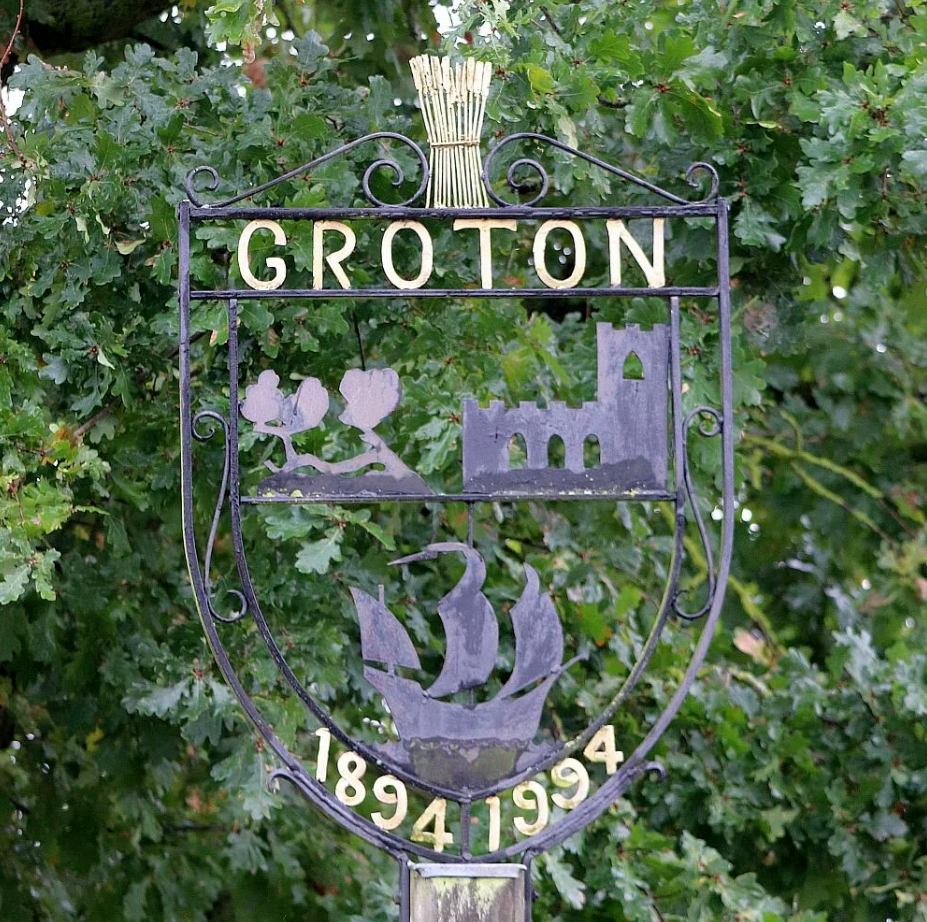Webmaster Notes
Groton, Suffolk

Groton is a village north of Boxford, Suffolk.
The background to this page a transcript from The Manors of Suffolk.
Need to expand on this - Winthrop Winthorp Massachusetts Bay Colony Boston
Exract from The Manors of Suffolk
GROTON. HERE was here but one manor, though 100 acres in Groton were held as belonging to the Manor of Cornard in early times. The main manor was held in Saxon times by the Abbot of Bury, and he was not disturbed at the Conquest. The holding consisted of i carucate and a half as a manor, 8 to villeins, 5 bordars, i ploughteam in demesne, 2 belonging the men, i acre of meadow, wood for 10 hogs, a winter mill, i rouncey, 6 beasts, 16 hogs and 30 sheep. There were also 2 freemen with half an acre of land which they could give away or sell, 6 bordars, i ploughteam and i acre of meadow. Formerly the value was 30 shillings, but in the time of the Domesday Survey 40. It was 7 quarantenes long and 4 broad. There were also 12 freemen who could give or sell their lands which consisted of i carucate in the Confessor's days. The value was 20 shillings, and the Abbot had soc, commendation and service and the payment in a gelt was 8^.' The holding in Groton which belonged to Cornard Manor was 4 socmen with 100 acres and 3 bordars. Among these was a ploughteam. The whole had in Saxon times been valued at 10 pounds, but later in Norman days at 26 shillings and 8^. by tale. It was six quarantenes and 3 perches long and 4^ quarantenes and 4 perches broad and paid io^d. in a gelt. The soc was in the township and the holding at the time of the Domesday Survey was that of Earl Morchar's mother which William the Chamberlain and Otho the Goldsmith kept in hand for the King.2 Richard son of Earl Gislebert3 had here a freeman by commendation and soc and sac who had 10 acres of land valued at 2od.4 and the only other holdings were encroachments upon the King. Thus this Richard son of Earl Gislebert held a freeman formerly under Robert son of Wimarc by commendation only with 60 acres of land, formerly 4 bordars then one, formerly i ploughteam then none, and i acre of land, all formerly valued at 10 shillings and then at 18. On this land Roger de Orbec encroached, and held it under Richard son of Gislebert, and Richard's men claimed it as belonging to the fee of Wisgar predecessor in title ; but according to the testimony of the Hundred, it never had belonged to that fee either by commendation or by soc.5
GROTON MANOR. The Abbot of Bury leased this manor to Robert de Cokefeld son of Adam son of Lemmerus6 for life, and on his death Abbot Sampson 3rd of Rich. I. granted a fresh lease to Robert's son Adam de Cokefield for life. Adam married Rohais and had issue an only child Nesta who married ist Thomas de Burgh. Adam de Cokefield having died about 1209 Rohais his widow released to the said Thomas de Burgh and Nesta his wife her dower in the lands of her late husband in this parish, Cockfield and Semere other lands being assigned to her in lieu thereof. After the death of Thomas de Burgh this Nesta married John de Beauchamp and finally, Matthew de Leyham. In the 26th Hen. III. this Matthew de
John Winthorp the 2nd son, but the eldest son by Adam's 2nd marriage, succeeded accordingly, barred the entail in 1594' and sold the manor to his brother Adam Winthorp, and his son John in 1609 when he engaged in a plantation in the South of Ireland. Adam was a lawyer and county magistrate and the writer of the Diary to be seen in " Life and Letters of John Winthorp." He had no issue by his first wife Alice daughter of William Still of Grantham co. Lincoln and sister of Dr. John Bull, Bishop of Bath and Wells, but had 4 children by his 2nd wife, Anne daughter and co-heir of Henry Browne of Edwardstone, and dying in 1623 was succeeded by his eldest son John Winthorp who removed from Groton to Boston in New England and became Governor of Massachusetts Bay Colony.* In 1631 he sold the manor to Thomas Waring. Thomas Waring was succeeded by Richard Waring ; and Thomas, (who was probably the son of the second son and heir of Richard Waring), died about the year 1769 aged 84 or thereabouts. He devised the manor to his cousin Walter Waring M.P. for Coventry who died about 1781 leaving an only son who died without issue. About 1780 the manor was acquired by the Rev. Seymour Leeke, who held it for some eight or nine years. In 1804 the manor was purchased by Sir William Rowley Bart, of Tendring Hall, Stoke by Nayland, after which the devolution is identical with Nayland Manor in this Hundred.